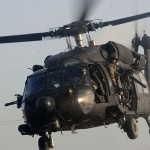Where I live in the piney woods of southern Chesterfield County, one can gauge U.S. foreign policy by sounds in the night sky.
Listening to them, I was able to mark the run up to the invasion of Iraq in 2003 and later, in 2011, the SEAL Team Six mission against Osama Bin-Laden.
It’s happening again. For the past several nights, I have heard the slow crescendo “THUMP, THUMP, THUMP” of helicopter blades racing over my house. It usually means one thing. America may be going to war.
This time it’s Syria and could be a very dangerous move. I’m not sure what my opinion is. The country run for decades by strong arm dictator Bashar Al-Assad has been in the middle of a civil war for two years. His forces have tipped the balance by using sarin gas to kill hundreds of civilians.
President Obama wants to play the morality card and punish Assad’s regime for using gas. The result has been a confusing mess. Our usual allies, the British, say no. The usually fickle French say “oui.” Russia’s Vladimir Putin is showing that he is a “myzh” by sending Russian intelligence and amphibious landing ships to the Mediterranean to confront American warships in a bizarre replay of the Cold War.
At home, hawks like U.S. Rep. Eric Cantor are for a strike while U.S. Senator Tim Kaine waivers. The Washington Post says that the intervention issue has made strange bedfellows of liberal Democrats and libertarians.
This morning, an old friend, a seasoned foreign correspondent with whom I worked for years at BusinessWeek, called to ask if the helicopters were flying. I said yes, they are either racing from D.C. to bases in the Carolinas or there are special ops practicing, as they typically do at Fort Pickett about 20 miles from my house.
The scenarios of intervention going wrong are awful to contemplate. A failed Syrian strike. Iran intervening against U.S. forces and Israel. A Middle East conflagration growing to something out of Dr. Strangelove between old foes America and Russia.
My friend said that we’d be idiotic to get involved. From 1980 to 1988, he said, we generally stayed out of the war between Iraq and Iran that killed thousands, including some by gas. That was a wise move. Let them settle their own differences. And, by the way, if Washington had a dog in that fight, it was none other than Saddam Hussein. How ironic.
Yet we did intervene in Bosnia and Herzegovina in the 1990s and likely kept many innocents, especially Muslims, from being slaughtered through ethnic cleansing.
We bought George W. Bush’s lies that there were weapons of mass destruction in Iraq. The result was a years-long war that killed hundreds 0f thousands (estimates are hard to follow) of civilians and Iraqi soldiers and more than 4,400 Americans. Afghanistan is a harder call and is notoriously tough place to deal with, as the British and the Soviets learned. When the U.S. got Bin Laden, it was actually in Pakistan, an ally to which we have given $18 plus billion in aid.
I’m no military expert, but it hard to understand how we can expect relatively slow-moving but highly-accurate cruise missiles to hit the right targets when Obama has given Assad weeks of warning. Yet Obama is right to ask for Congressional support. That’s what Franklin D. Roosevelt asked when the Japanese attacked us. In this case, no one has attacked us.
Also, who’s to say that the Syrian rebels are people we want to befriend. They can be just as ruthless as government troops as a photo on yesterday’s front page of The New York Times shows.
Back in the 1980s, when Soviets were intervening in Afghanistan, Ronald Reagan and Rambo were creating the myth that the mujaheddin fighters were patriotic underdogs, something out of a movie about our own Revolutionary War. We supplied them and, years later, some of the same were killing our people in their country.
This time, thanks to quirks of geography, missteps will be far more catastrophic because Syria is hardly as remote as Afghanistan.
I wonder if the choppers will be flying tonight.



